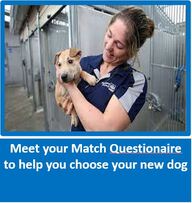|
We care about dogs. To lend a helping hand to mutts in need, MuttMix will donate R100 to a shelter for each kit distributed by that shelter. We’ve been working to put MuttMix in shelters so that people who adopt a pet can find out more about the new addition to their family. The list of our current partners is on website. A huge benefit to shelters, is to know the actual breed make-up of the dog in question, as this will go a long way in helping them find the right home for their needs, plus, finding out what other breeds the dog will get along with. www.muttmix.co.za
|
Why it's a good idea for shelters to consider DNA testing
www.dogtipper.com - lovely website! Lots of tips, articles on various aspects of dogs, dogs names, breed info, Giveaways, and so much more - enjoy!
www.dogtipper.com - lovely website! Lots of tips, articles on various aspects of dogs, dogs names, breed info, Giveaways, and so much more - enjoy!

Imagine visiting your local dog shelter in the hopes of adopting a “furever” friend. You spot a lovable mutt with whom you feel an instant connection and think, “This could be the one!” But wait… is she a German Shepherd? She kind of looks like a German Shepherd, and your apartment building doesn’t allow them. Or perhaps you love the temperament of German Shepherds, and you would prefer to find a pure-breed or mix to rescue. You simply aren’t sure if this pup fits the bill, and uncertainty wins out.
Here are a few ways that accurately identifying a dog’s breeds with a canine DNA test can ultimately save more rescues by making them more adoptable:
DNA testing increases a dog’s likelihood of being adopted.
Accurately determining the breeds in a rescue dog drastically increases their chances of being adopted. And most of the time, veterinarians and shelter staff—no matter how experienced and well-intentioned—do not guess right. Research confirms that only a little over 20% of visual identification of mixed-breed dogs are accurate when compared with their DNA test results. That means nearly 80% of shelter dogs’ breeds are misidentified.
The effects of misidentification are profound for rescue dogs, and leave many unadopted. A simple canine DNA test can change that. Shelters that use DNA testing report that many dogs will sit for months with little-to-no interest from potential families, and will then be adopted within days of completing a DNA test.
DNA testing helps the shelter to help the dog.
Breed-specific legislation, breed-related health concerns, and breed-associated behavioral characteristics are just some of the reasons it’s crucial to correctly identify a dog’s breed with a DNA test upon entering a shelter. It helps the staff to know how adoptable the dog is from the get-go, while equipping them with the knowledge to best meet the dog’s needs while in their care. When shelter staff know how to adequately stimulate, handle, and work with the dog, it allows for an overall better shelter experience and a happier, more adoptable dog. Most importantly, it helps staff to match the dog with a forever home that’s right for them.
DNA testing helps the adopter to know if a dog is the right fit for their home/family.
Knowing what to expect from a dog gives people the ability to make an informed decision when choosing the right dog for their family. If they are interested in a puppy, the adopter will benefit from knowing how large it will grow to be and what to expect behavior and personality-wise. A dog may resemble a hypoallergenic breed, but if someone in the adopting family is allergic to dog fur, they will want to be certain. Is the dog a low-shedding breed? Will it be prone to excessive drooling?
What health concerns might the pup be faced with down the line? These can be deciding factors for some people looking to adopt a dog. A DNA test can put these questions and concerns to rest while giving dogs with an otherwise low likelihood of adoption a legitimate chance.
DNA testing can better ensure a forever home for the dog.
If an adopter knows what to expect from the dog they’ve chosen, they are far more likely to be satisfied with their decision and less likely to give up the dog after a short time. They won’t be taken by surprise when a facet of the dog’s hyperactive personality makes itself known at 2AM; they will be able to take preventative steps to better ensure a long, healthy life for the dog; and they’ll know to keep a vacuum on-call if the dog sheds like a tree in Autumn. Being adequately prepared from the beginning allows the adopter to fully embrace their beloved mutt as all of their quirks unfold. All thanks to a simple DNA test.
Here are a few ways that accurately identifying a dog’s breeds with a canine DNA test can ultimately save more rescues by making them more adoptable:
DNA testing increases a dog’s likelihood of being adopted.
Accurately determining the breeds in a rescue dog drastically increases their chances of being adopted. And most of the time, veterinarians and shelter staff—no matter how experienced and well-intentioned—do not guess right. Research confirms that only a little over 20% of visual identification of mixed-breed dogs are accurate when compared with their DNA test results. That means nearly 80% of shelter dogs’ breeds are misidentified.
The effects of misidentification are profound for rescue dogs, and leave many unadopted. A simple canine DNA test can change that. Shelters that use DNA testing report that many dogs will sit for months with little-to-no interest from potential families, and will then be adopted within days of completing a DNA test.
DNA testing helps the shelter to help the dog.
Breed-specific legislation, breed-related health concerns, and breed-associated behavioral characteristics are just some of the reasons it’s crucial to correctly identify a dog’s breed with a DNA test upon entering a shelter. It helps the staff to know how adoptable the dog is from the get-go, while equipping them with the knowledge to best meet the dog’s needs while in their care. When shelter staff know how to adequately stimulate, handle, and work with the dog, it allows for an overall better shelter experience and a happier, more adoptable dog. Most importantly, it helps staff to match the dog with a forever home that’s right for them.
DNA testing helps the adopter to know if a dog is the right fit for their home/family.
Knowing what to expect from a dog gives people the ability to make an informed decision when choosing the right dog for their family. If they are interested in a puppy, the adopter will benefit from knowing how large it will grow to be and what to expect behavior and personality-wise. A dog may resemble a hypoallergenic breed, but if someone in the adopting family is allergic to dog fur, they will want to be certain. Is the dog a low-shedding breed? Will it be prone to excessive drooling?
What health concerns might the pup be faced with down the line? These can be deciding factors for some people looking to adopt a dog. A DNA test can put these questions and concerns to rest while giving dogs with an otherwise low likelihood of adoption a legitimate chance.
DNA testing can better ensure a forever home for the dog.
If an adopter knows what to expect from the dog they’ve chosen, they are far more likely to be satisfied with their decision and less likely to give up the dog after a short time. They won’t be taken by surprise when a facet of the dog’s hyperactive personality makes itself known at 2AM; they will be able to take preventative steps to better ensure a long, healthy life for the dog; and they’ll know to keep a vacuum on-call if the dog sheds like a tree in Autumn. Being adequately prepared from the beginning allows the adopter to fully embrace their beloved mutt as all of their quirks unfold. All thanks to a simple DNA test.





